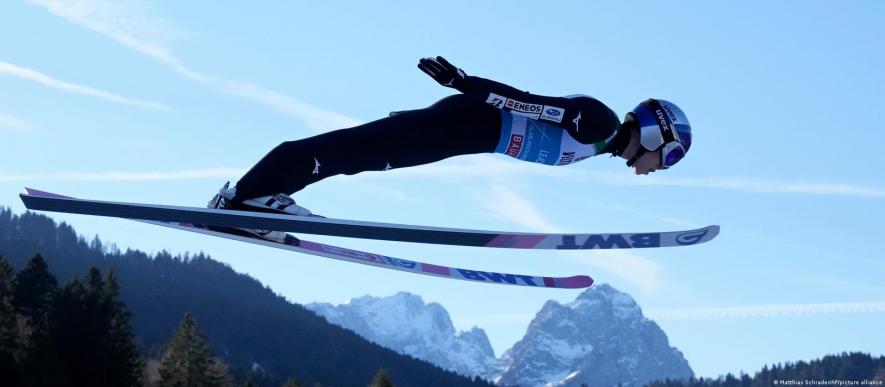Are Winter Sports Threatened with Extinction?

"I believe it would be good for us to get away from the term winter sports."
This sentence was spoken by Alexander Stöckl, a ski-jumping coach, of all people. The Austrian, who has been in charge of the Norwegian national team since 2011, does not necessarily see the future of his sport on snow-covered hills and jumping slopes.
"I think it'd be good if we tried to bring in a year-round mindset," said Stöckl. "I believe that we are an extreme sport and that you can do it no matter where and no matter how."
![]()

Alexander Stöckl believes ski jumping can adapt to suit modern timesImage: Joachim Hahne/johapress/picture alliance
The start of this season helped make the Austrian's point. There was no snow in Zakopane, Poland at the beginning of November, so the ski jumpers had to land on mats instead of powder.
"We are lucky that we can use mats, that it is feasible and that we don't need snow," said Stöckl, with a view to climate change.
Mat jumping: Just add water and electricity
In fact, jumpers have been using mats in preseason training for years. The mats can be used year-round with only water and electricity required. Water is constantly fed into the inrun track, which consists of two plastic or ceramic channels. It partially freezes there thanks to cooling units underneath.
![]()

Ski mats allow competitions to take place whatever the weatherImage: firo Sportphoto/picture alliance
The individual fibers of the mat resemble the very long bristles of a coarse broom and are constantly watered from the sides. The watering of the jump and the uphill slope form a closed circuit. The water is collected at the bottom, pumped upwards and reused. The mats remain on the slope even in winter and are covered with netting so that the snow sticks to them and does not slide off. The slope's gradient is 35 to 38 degrees at its steepest point.
Ski jumping in Africa or Australia?
The fact that you no longer need snow to hold a ski-jumping event has Alexander Stöckl thinking about new possibilities.
"What would it be like if in 10 years' time children all over the world dreamed of flying 250 meters on skis?” he asked. "And not just those who ski in Europe or maybe in North America. We can do that because we can install mat jumps anywhere."
So, ski jumping in Africa, Australia or South America? And possibly in completely new formats, away from traditional ski jumping with first and second rounds? A willingness to move away from winter sports and towards extreme sports is gathering pace among the athletes.
"Basically, I do believe that you always have to develop further – even in terms of formats," said Germany's top ski jumper, Karl Geiger. "I wouldn't dismiss the idea as completely absurd."
![]()

Karl Geiger is one of the athletes who sees that his sport must seek new frontiersImage: Angelika Warmuth/dpa/picture alliance
It’s more difficult to judge how quickly fans would accept snow-free competitions outside the usual season and venues. After all, there has been a World Cup since 1994, but it has not been a resounding success, even in traditional ski-jumping nations.
Alpine skiing struggles for future
Alpine skiing is facing much more difficulties than ski jumping. At the start of this World Cup winter, several entire weekends had to be canceled because the weather was too mild. An overcrowded World Cup calendar with races in areas that are no longer guaranteed to have snow as early as October is a problem. The national ski federations had raised this concern with the world governing body FIS, but their protests have fallen on deaf ears.
"Nobody wanted the season to start so early in October," Wolfgang Maier, Alpine director of the German Ski Association (DSV), told German broadcaster Sport1. Maier has called for the start of the season to be moved to November and for it to wrap up by mid-March at the latest.
At a time when glaciers are melting, alpine skiing is already having a hard time defending its raison d'être. Ski resorts take up a lot of land, and the effects on the environment are enormous. The lack of natural snow makes it necessary to make artificial snow,which uses up a lot of energy. This is particularly problematic during an energy crisis. The pistes, lifts, roads, parking lots and hotels require a lot of space, which is takes away from the natural habitat of plants and animals.
No hosts for Winter Games?
The International Olympic Committee (IOC) is also worried about the future of winter sports, because as climate change progresses, the number of potential hosts for the Winter Olympics is declining.
![]()

The creation of venues for Winter Olympics is a costly businessImage: Sun Fei/picture-alliance/Xinhua News Agency
IOC President Thomas Bach has described the impact of climate change on winter sports as "alarming." In 2026, the Winter Games are to be hosted by Milan and Cortina d'Ampezzo, a region in which (so far) ample snow is almost a certainty. However, the awarding of the hosting rights for the 2030 Winter Games has been postponed for a year.
Apart from the problem of finding a venue that is more-or-less guaranteed to have enough snow in February, there is a growing lack of support for hosting Olympic Games among the general population and politicians. Who would want to spend billions in taxpayer money to build ski slopes, cross-country ski trails and a bobsleigh and luge track that will either not be used afterwards or can only be operated with great effort and at high costs?
Vancouver, 2010 host, and one of the promising candidates for 2030, seems to be out of the running, as the government of the province of British Columbia refused to spend billions in taxpayer money to support a bid. The Japanese winter sports resort of Sapporo, which hosted the 1972 Winter Games, has put its bid on hold. The local authorities want to conduct a nationwide survey in the spring to gauge how much enthusiasm the population still has for the Olympics after the corruption scandal surrounding the 2020 Summer Games in Tokyo.
Rotation model?
Researchers recently determined that most of the previous hosts of the Winter Games would no longer be able to offer appropriate conditions for the Olympics by the end of this century anyway. There are reports that the IOC is considering moving to a system in which the Games would rotate among a fixed number of hosts – instead of the current bidding process for hosting rights.
This, of course, assumes that people in those regions even support hosting major winter sporting events in the first place.
This article was first published in German.
Get the latest reports & analysis with people's perspective on Protests, movements & deep analytical videos, discussions of the current affairs in your Telegram app. Subscribe to NewsClick's Telegram channel & get Real-Time updates on stories, as they get published on our website.
























